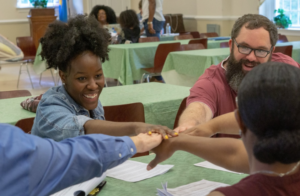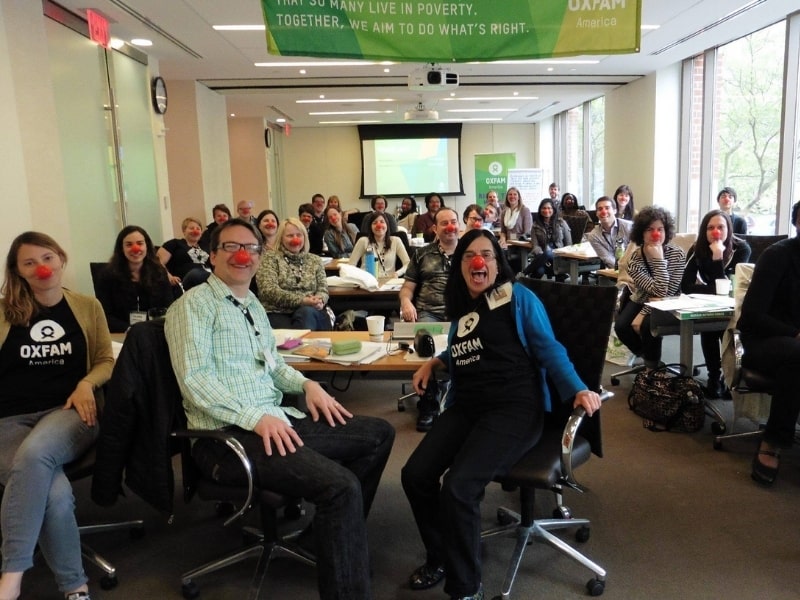A guest post by LCN member Drew Serres from Network Delaware (US) an organization focused on organizing, leadership development, and policy change.
“Give light, and people will find the way…” ~ Ella Baker
I always thought of myself as a quiet guy and never thought I could do much to support a cause. I thought I had to be the one with a megaphone, until one day an organizer friend asked me to take on a leadership role. I said “I could never do that, I don’t have the skills.”. Then she replied “Yes, you can. You just have to get trained and develop your skills.”
So I thought about it and realized it was worth trying, so I signed up for an organizer training program right after. As soon as I arrived at the organizer training program I knew I was in the right place. There I saw I still had a lot to learn, but I had more experience than I realized.
Skipping ahead a few years, now I get the opportunity almost every day to support others in understanding their own skills in fighting for change. If a “quiet guy” like me can do it, they can too!
Developing civic leadership in Delaware
It was about this time last year, after a state primary election here in Delaware, I was in a planning meeting for Network Delaware for folks who wanted to get more involved, but weren’t sure where to get started.
As I looked around the room at all the new faces, I started to think about what I could do to help them grow their own skills over the coming year.
I realized while I knew lots of things people could do with our group (joining an issue campaign team, attending an organizing training, etc.), I hadn’t put as much time into creating a structured learning environment where people could develop their skills. I wanted to have a much clearer leadership path/ladder so people understood the possibilities for their own organizer journey.
So I decided to pull together a group of committed volunteers to figure out what we could do to better develop people’s leadership. This group of people had grown their own skills within the organization so while I wasn’t sure exactly what we’d come up with, I knew the people around the table would help us find one of the right paths to travel.
Over the next few months we researched, debated ideas, and experimented with a few different methods.
Eventually, we adapted our new “Leadership Development Pipeline” that has been a huge boost to our people in terms of supporting their confidence to organize for change.
Fast forward to a year later, now when I’m in a meeting with new folks I know exactly where to send them to develop their own skills (e.g. our volunteer orientation, “Organizing Change Training Program,” and then eventually a team member/leader). I have already seen the results of people coordinating their first issue campaign, hosting a house meeting, or even training others on how to conduct an effective 1-on-1 meeting.
Here’s a few of the lessons I was lucky to learn in effective leadership development within an organization.
Overview of Leadership Development
As the Ella Baker quote at the beginning reminds me, sometimes people just need to know they can make a difference and they will find their own path.
That’s why at its core, leadership development is about showing your commitment to others to build confidence in themselves and their expression of leadership.
In addition, leadership development should be a continual process of learning and growth, you’re never completely “done.” It’s about creating opportunities for others to develop their own skills and creating opportunities for others to succeed.
Keys to Leadership Development
Below are some “keys” to keep in mind when creating your own leadership development model.
1. Build collective leadership (i.e. the “snowflake”)
Instead of a purely top-down model, allow for people at all levels to take on leadership roles and responsibilities (i.e. as in Marshall Ganz’s snowflake model of leadership). Allow for more peer leadership and support. Ella Baker’s quote “Strong people don’t need strong leaders” highlights this idea that we should rely on a committed changemaker group, instead of just a few individuals.
2. Develop leaders instead of just identifying/selecting leaders
It may seem easier to recruit someone who already exhibits
strong leadership capabilities, but that marginalizes people who have leadership potential they just haven’t had as many opportunities to express it. This mindset of selecting leaders also hinders the number of people you can develop long-term.
In Rinku Sen’s book Stir It Up, she describes that instead of just picking out folks who have had the opportunity to express some level of leadership, we need to spend significant time and energy to build activist capacity to fight the “isms” (e.g. sexism, ableism, colonialism).
3. Prepare for leadership rejuvenation
This principle, another one from Rinku Sen’s book Stir It Up, advocates for putting procedures in place to reduce “burnout” (e.g. rotating work schedule, extended breaks, incorporating mental/physical health into the group’s operations). Often organizing takes significant person energy, so if we want to develop leaders for the long-haul we have to support their body, mind, and spirit. It doesn’t help to spend time training/coaching someone for 1–2 years for them to drop out due to burnout.
4. Create multiple opportunities for leadership development and learning
Cesar Chavez noted that people learn leadership skills, they are not born with them. He said leaders develop their ability “on the picket line.” Thus, we have to provide opportunities for new leaders to hone their capabilities. To create an ecosystem of learning consider adopting these 3 key ways of developing others:
- Hands-on practice (~70% of time)
- Coaching/mentoring/guidance (~20% of time)
- Trainings/workshops (~10% of time)
5. Expect and push for the best from people (in the way that they’re looking for)
Even if someone doesn’t think they can “be a leader” or achieve something, we must never forget to show our dedication and belief in an individual’s ability to be who they wish to be. Just identify in advance how someone wishes to be “stretched” in their abilities. We focus on investing in those who continually challenge themselves to learn and grow.
Case Study of Network Delaware’s Leadership Development Practices
So after considering some of the above principles, what changed about our organization and for our members?
We started incorporating about 15–20 minutes of training into all our monthly “Network Action Team” meetings (i.e. our chapter meetings) and also we’re about to do the same for some of our issue campaign meetings. That way every month, little-by-little, we’re improving.
In these teams we also have a much better structure that allows for both consistent and rotating leadership roles. Now as soon as people get involved we often ask people to take on a rotating role for a few months, and after seeing their progress we ask them to take on a consistent role.
Last spring we started the Ella Baker Black Organizers Group which was designed for aspiring Black (African-American, Caribbean, African, Afro-Latino) organizers wishing to improve their skills to make an impact for racial justice and fight for Black liberation. This program, led by members, prepares a small group on the challenges and opportunities of being a Black organizer in the U.S. (e.g. through a study of history, organizing models, and peer learning).
While we now have lots of opportunities for hands-on learning and trainings/workshops, we haven’t setup a strong coaching program yet. We’re currently working on designing a peer coaching framework that will allow us to expand beyond our small group of existing coaches.
These are just some of the areas we’ve started to change, we still have a long way to go!
 Improving your leadership development model
Improving your leadership development model
While we made some great improvements in this last year on how to develop leaders, the process is never done! Now we’re onto the next round of adaptations on how we can improve.
What works for your organization in building leadership?
Reply in the box below and let’s build a great set of leadership development ideas from all across the Leading Change Network!
— Drew Serres from Network Delaware, 2019


